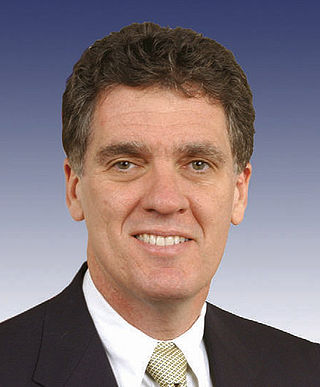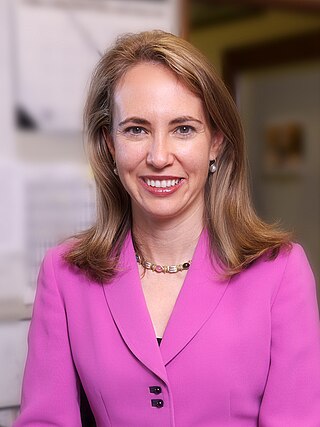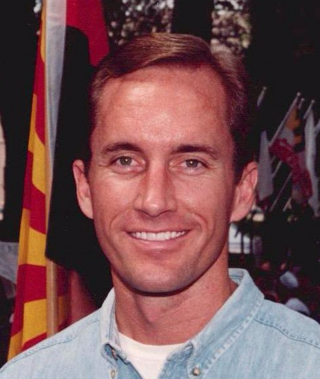Related Research Articles

Thomas Miller McClintock II is an American politician serving as the U.S. representative for California's 5th congressional district since 2009. His district stretches from the Sacramento suburbs to the outer suburbs of Fresno; it includes Yosemite National Park. A member of the Republican Party, McClintock served as a California state assemblyman from 1982 to 1992 and from 1996 to 2000, when he became a California state senator, a position he held until 2008. He unsuccessfully ran for governor of California in the 2003 recall election and for lieutenant governor of California in the 2006 election.

Harold Trent Franks is an American businessman and former politician who served as the U.S. representative for Arizona's 8th congressional district from 2003 to 2017. He is a member of the Republican Party. During his tenure, Franks served as vice chairman of the United States House Armed Services Subcommittee on Strategic Forces and chairman of the United States House Judiciary Subcommittee on the Constitution, Civil Rights and Civil Liberties.

David Joseph Weldon is an American politician and physician. He was a Republican member of the United States House of Representatives, representing Florida's 15th congressional district, and was an unsuccessful candidate for the Republican nomination in Florida's 2012 U.S. Senate race. Weldon was a vocal advocate for medical privacy rights, sponsoring legislation to limit government access to patient health records without consent.

Matthew James Salmon is an American politician who served as a U.S. representative from Arizona from 1995 to 2001 and again from 2013 until 2017. A member of the Republican Party, he retired from office after representing Arizona's 5th congressional district. The district is based in Mesa and includes most of the East Valley; he previously represented Arizona's 1st congressional district. In 2002, he lost by less than 1% to Janet Napolitano in a highly competitive gubernatorial race. He regained a congressional seat in the 2012 election.

The 1988 United States Senate elections were elections for the United States Senate. Held on November 8, 1988, the 33 seats of Class 1 were contested in regular elections. In spite of the Republican victory by George H. W. Bush in the presidential election, the Democrats gained a net of 1 seat in the Senate. 7 seats changed parties, with 4 incumbents being defeated. The Democratic majority in the Senate increased by one to 55–45.

The 1986 United States Senate elections were elections for the United States Senate. Held on November 4, in the middle of Ronald Reagan's second presidential term, the 34 seats of Class 3 were contested in regular elections. The Republicans had to defend an unusually large number of freshman Senate incumbents who had been elected on President Ronald Reagan's coattails in 1980. Democrats won a net of eight seats, defeating seven freshman incumbents, picking up two Republican-held open seats, and regaining control of the Senate for the first time since January 1981. This remains the most recent midterm election cycle in which the sitting president's party suffered net losses while still flipping a Senate seat.

The 1980 United States Senate elections were held on November 4, coinciding with Ronald Reagan's victory in the presidential election. The 34 Senate seats of Class 3 were contested in regular elections. Reagan's large margin of victory over incumbent Jimmy Carter gave a huge boost to Republican Senate candidates, allowing them to flip 12 Democratic seats and win control of the chamber for the first time since the end of the 83rd Congress in January 1955. This was the first time since 1966 that any party successfully defended all their own seats.

The 1976 United States Senate elections was an election for the United States Senate. Held on November 2, the 33 seats of Class 1 were contested in regular elections. They coincided with Democrat Jimmy Carter's presidential election and the United States Bicentennial celebration. Although almost half of the seats decided in this election changed parties, Carter's narrow victory did not provide coattails for the Democratic Party. Each party flipped seven Senate seats, although, one of the seats flipped by Democrats was previously held by a Conservative.

The 1964 United States Senate elections were held on November 3. The 33 seats of Class 1 were contested in regular elections. Special elections were also held to fill vacancies. They coincided with the election of President Lyndon B. Johnson by an overwhelming majority, to a full term. His Democratic Party picked up a net two seats from the Republicans. As of 2023, this was the last time either party has had a two-thirds majority in the Senate, which allowed the Senate Democrats to override a veto, propose constitutional amendments, or convict and expel certain officials without any votes from Senate Republicans. However, internal divisions would have prevented the Democrats from having done so. The Senate election cycle coincided with Democratic gains in the House in the same year.

Cornelius Harvey McGillicuddy IV, known popularly as Connie Mack IV, is an American politician and lobbyist. He is the former U.S. Representative for Florida's 14th congressional district, serving from 2005 to 2013. A Republican, he ran for the U.S. Senate in 2012, losing to Democrat Bill Nelson. He is the son of former Republican U.S. Senator Connie Mack III and the great-grandson of baseball manager Connie Mack.

The 1954 United States Senate elections was a midterm election in the first term of Dwight D. Eisenhower's presidency. The 32 Senate seats of Class 2 were contested in regular elections, and six special elections were held to fill vacancies. Eisenhower's Republican party lost a net of two seats to the Democratic opposition. This small change was just enough to give Democrats control of the chamber with the help of the Independent who at the start of this Congress in January 1955 agreed to caucus with them; he later officially joined the party in April 1955.

Donald Allen Bailey was an American lawyer and politician from Pennsylvania. He was a Democratic member of the United States House of Representatives from 1979 to 1983, Auditor General of Pennsylvania from 1985 to 1989, and a candidate for the Democratic nomination for United States Senate and Governor of Pennsylvania. His Congressional District (PA-21) included all of Westmoreland County, Pennsylvania with a sliver of Allegheny County, Pennsylvania, prior to the 1981 redistricting.

The 2006 Arizona 8th congressional district election was an election for the United States House of Representatives for the open seat of incumbent Republican Jim Kolbe, who was not running for re-election. The primary was held on September 12, 2006, and the two major party winners were Republican Randy Graf, a former state Representative who challenged Kolbe for the GOP nomination in 2004, and former State Senator Gabby Giffords. Libertarian Dave Nolan, who was uncontested in the primary, was also in the November 7, 2006 general election. Graf was considered too conservative for the district: Kolbe withheld his endorsement, and towards the end of the election the National GOP pulled their support. By election time, most non-partisan analyses considered this race the most likely district to switch hands, which it did, as Giffords won a decisive victory, 54% to 42%.

Richard R. Tisei is an American politician and real estate agent from Massachusetts. A Republican, he served in both chambers of the Massachusetts General Court for a combined 26 years, eventually becoming Minority Leader in the Massachusetts Senate. He was the Republican nominee for Lieutenant Governor of Massachusetts in 2010 and the nominee for Congress from Massachusetts's 6th district in 2012 and 2014.

Scott Bundgaard is a Republican politician who served in the Arizona House of Representatives and in the Arizona State Senate. Bundgaard was elected in 2010 as Majority Leader of the Arizona State Senate, and later served as Vice-Chairman of the Senate Finance Committee.
Matthew G. Heinz is an American doctor and politician. A Democrat, he was appointed by President Barack Obama in June 2013 as Director of Provider Outreach in the Office of Intergovernmental and External Affairs, a part of the U.S. Department of Health and Human Services. Heinz was tasked with helping Secretary Kathleen Sebelius with the roll-out of the Affordable Care Act, with one aspect of his job to work with LGBT organizations across the country as they inform their members of their options in each state. For one or two weekends per month, Heinz continued his work as a hospitalist in Tucson, Arizona. Heinz left the position in March 2015.

The 2012 United States House of Representatives elections in Arizona were held on Tuesday, November 6, 2012, to elect the nine U.S. representatives from the state, one from each of the state's nine congressional districts, including the newly created 9th district following the 2010 United States census. The elections coincided with other federal and state elections, including a quadrennial presidential election, and a U.S. Senate election. Primary elections were held on August 28, 2012.
Ronald Charles Gould is a small business owner and a former Republican member of the Arizona Senate from Lake Havasu City, representing the 3rd Senate District from 2005 until 2013.

The 2016 United States House of Representatives elections in Arizona were held on November 8, 2016, to elect the nine U.S. representatives from the state of Arizona, one from each of the state's nine congressional districts. The elections coincided with the 2016 U.S. presidential election, as well as other elections to the House of Representatives, elections to the United States Senate and various state and local elections. The primaries were held on August 30.

The 2018 United States House of Representatives elections in Arizona were held on November 6, 2018, to elect the nine U.S. representatives from the State of Arizona, one from each of the state's nine congressional districts. The elections coincided with the 2018 Arizona gubernatorial election, as well as other elections to the U.S. House of Representatives, elections to the United States Senate and various state and local elections. The 2018 general elections saw the Democratic party gain the 2nd congressional district, thus flipping the state from a 5–4 Republican advantage to a 5–4 Democratic advantage, the first time since the 2012 election in which Democrats held more House seats in Arizona than the Republicans.
References
- ↑ "Our Campaigns – Candidate – Frank Antenori". www.ourcampaigns.com.
- ↑ "House Member – Arizona Legislature". Archived from the original on 2012-01-18. Retrieved 2012-02-06.
- ↑ "Our Campaigns – AZ District 8 – R Primary Race". www.ourcampaigns.com. Sep 12, 2006.
- ↑ "Our Campaigns – AZ State House 30 – R Primary Race". www.ourcampaigns.com. Sep 2, 2008.
- ↑ "Our Campaigns – AZ State House 30 Race". www.ourcampaigns.com. Nov 4, 2008.
- ↑ "Our Campaigns – AZ State Senate 30 Race". www.ourcampaigns.com. Nov 2, 2010.
- ↑ "House Member – Arizona Legislature". Archived from the original on 2012-01-18. Retrieved 2012-02-06.
- ↑ "AZ Sen. Frank Antenori to run for Congressional District 8 - KGUN9.com". Archived from the original on 2012-05-03. Retrieved 2012-02-06.
- ↑ "2012 Election: Arizona House 8 Special Primary". Politico.
- ↑ "Elitists, crybabies and junky degrees". Washington Post. November 25, 2017. Retrieved November 27, 2017.